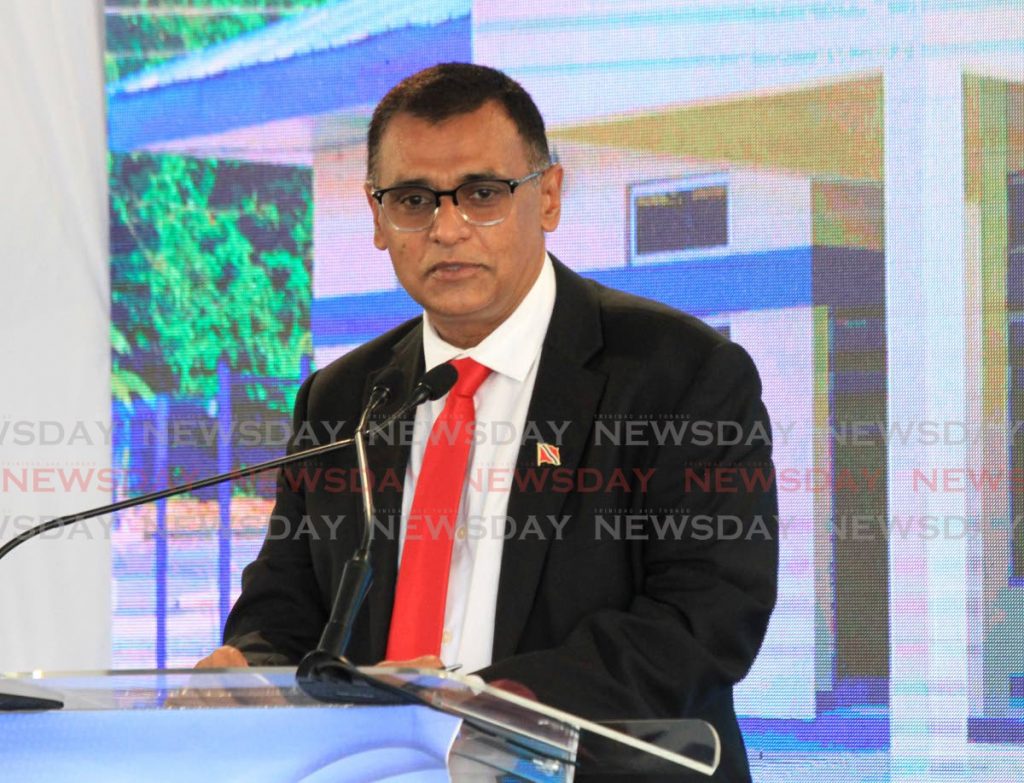Sinanan: Electric buses, new rural maxis coming in 2022

A fleet of 300 new PTSC buses, including electric ones, and a new maxi-taxi route are among the 2022 plans of the Ministry of Works and Transport.
Speaking at his Richmond Street office on December 30, Minister of Works and Transport Rohan Sinanan revealed plans to bring the new buses into the Public Transport Service Commission (PTSC) service. He said the plans had long been under way for 300 electric buses to join the PTSC fleet, but the covid19 pandemic has thrown off the timeline. He attributed the delay to shipping issues caused by covid19.
Sinanan said though the original plan was to have an additional 300 electric buses, the fleet expansion will now include a mix of electric and diesel buses.
There are also plans to introduce a new maxi-taxi route to service rural areas. These maxis will bear a chequered stripe and will have designated south- and northbound highway lanes. He did not give a definite timeline for the introduction of the special lane, but the new class of maxi taxis will be on stream as early as February.
The minister noted that public transport is heavily subsidised by the government, and emphasised the various sectors of the population who are entitled to free use of the PTSC service. He said children in school uniform, the elderly, PTSC workers and some public servants are just some of the PTSC passengers who travel for free.
Asked about the water taxi, Sinanan said there are no plans to include additional sailings or routes, as there is not a high demand for the service outside the already scheduled hours.
He said a park-and-ride service between San Fernando and Port of Spain was intended to fill the gap between water-taxi sailings during the day, but plans to launch this service were derailed by the covid19 pandemic, as gatherings and public transport capacity became limited, which would leave the service operating at a loss.
There are long-term plans, he said, to create a central public transport hub in Tarouba, for which land has already been acquired. He was unable to give a definitive date as to when work on the infrastructure of the hub will begin.
On "private hire" (PH) taxis, Sinanan said the ministry is consulting the office of the Attorney General to review the proposed legislation for PH taxis to operate legally in the new year.
Sinanan said though the ministry cannot control the fares charged by private maxi and taxi drivers, it is committed to offering a subsided public transport system through the PTSC.
On road maintenance and rehabilitation, he said though the roads are under the portfolio of the ministry, their destruction and disintegration are usually the fault of third parties such as WASA and internet service providers. He said the laws clearly say these entities are responsible for road repairs when they cause damage.
During this year, the ministry introduced three road-maintenance programmes that include clearing overgrown vegetation, drainage and patching damaged roads.
Asked about Africa Road, Laventille, which has become impassable, he said, "That does not fall under the Ministry of Works, but the ministry assists the regional corporations from time to time, based on the availability of funding. The ministry facilitated the rehabilitation of Africa Road just a few years ago, but unfortunately the road has disintegrated because of WASA leaks.
He lamented that WASA has a large role to play in the upkeep and repair of roads, attributing severe challenges with road maintenance to WASA needing to do timely repairs to leaks.
"Though the roads belong to the ministry, it falls on WASA and other agencies to repair the roads in accordance with the laws of TT. They are mandated to repair any damages caused by leaks or upgrades from their agency. The ministry has to continuously push WASA to comply with the regulations."
Every three years, Sinanan said, the ministry does a conditional road survey where roads are assessed based on their classification, the volume of traffic and road connectivity. Based on that we look at the roads that are most critical, with the use of a scale method of roads which need to be paved and rehabilitated."
He said there are 40 teams assigned to patching potholes in roads across the corporations and within the ministry.
Sinanan said the ministry has bought materials for use by the regional corporations to repair and refurbish damaged roads and is waiting for them to collect it and start work.
Asked about drivers seeking compensation for damage to vehicles caused by bad roads, he said, "Private citizens are free to seek compensation for damage to their property as is their right. They just need to follow the proper channels to do so. Often blame falls on the ministry when road damage is the fault of other agencies such as WASA."
Calls to the Couva/Tabaquite/Talparo, San Juan/Laventille Regional Corporations and the Ministry of Rural Development and Local Government went unanswered on Thursday afternoon.


Comments
"Sinanan: Electric buses, new rural maxis coming in 2022"